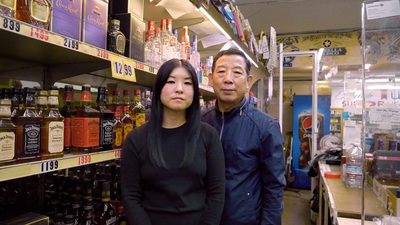
- Industry
Docs: “Liquor Store Dreams” Unpacks Personal Stories as Part of Social, Racial Reflection
The adage “write what you know” is such an old saw that many aspiring authors, songwriters, and other artists almost seem to instinctively recoil from it. Filmmakers, especially these days, seem enchanted instead by digital technology that, in both the fiction and nonfiction realms, allows for inexpensive indulgences of far-flung horizons.
But there’s a reason that saying exists and persists. And it can be found in director So Yun Um’s rewarding, deeply felt documentary Liquor Store Dreams, which just enjoyed its world premiere at the Tribeca Film Festival.
Telling the stories of first-generation Korean immigrants who made the most of limited economic opportunities by running liquor stores in predominantly black and brown communities in Los Angeles, as well as the impact of this fraught existence on their children, the film applies an edifying, highly personal lens to relations within minority communities both before and after the 1992 Los Angeles uprisings. Restless but eventually hopeful, it sifts through immigrant yearning and generational divisions to deliver a story that reflects upon the jostling, grinding nature of especially the lower ladder rungs of the American dream.
Liquor Store Dreams could rather easily take a macro approach with its narrative, as an estimated 75 percent in South Central Los Angeles liquor stores are Korean-owned, and there are more than 3,000 local members of a professional independent shopkeepers’ association. But Um, a Sundance Institute Documentary Film Program grantee and Center for Asian American Media 2021 Fellow who has enjoyed mentorship from One Child Nation and In the Same Breath director Nanfu Wang, smartly restricts the scope of her film. She chooses to focus on her own family and that of friend and fellow “liquor store baby” Danny Park.
In self-analyzing voiceover narration, Um details the confusing jumble of shame and rage she felt in adolescence when the 15-hour work days of her father Hae Sup conflicted with the increased financial stability their Long Beach shop provided for her, her mother Hye Sun, and her sister. Meanwhile, following his father’s death, Park leaves a comfortable white-collar job at Nike to return and help his mother manage their Best Market shop, which faces unique challenges related to its location along Skid Row in Downtown Los Angeles. Later, as their respective stores experience further upheaval with the COVID-19 pandemic, both Um and Park have to consider whether they want their businesses to remain in the family. In this cross-cutting, it’s interesting to witness the pair’s shared devotion to their parents, even though they have very different connections to them.
Um’s movie, which intelligently integrates film clips showing the mainstream stereotyped portrayal of Korean shop owners, is partially an excavation of hyper-localized race relations. To this end, it has a few interviews with outside figures, like UCLA professor of Anthropology and Asian American Studies Kyeyoung Park, who provide valuable additional social context. And when Liquor Store Dreams reaches back to explore one of its pivot points, the 1991 videotaped beating of Rodney King (and subsequent acquittal of the police officers responsible), it also delves into an important event less emblazoned onto the national consciousness: the murder two weeks later of Latasha Harlins, a 15-year-old African American fatally shot by Korean-American shopkeeper Soon Ja Du.
Apart from its inventorying of complicated racial dynamics, which savvily flows from personal knowledge, there is a richness in the other main story of Liquor Store Dreams—in merely gaining insight into the lives and struggles of people with whom many of us might interact somewhat frequently, but rarely truly see. In its well-manicured quotidian beauty, Um’s film, expanded from her 2018 short Liquor Store Babies, validates the importance of representation by way of the marginalized communities it uplifts in celebratory fashion, and the empathy it effortlessly generates.
What perhaps most recommends Liquor Store Dreams, though, is the affecting fashion in which it locates familial grace — unpacking generational anxieties and agonies and showing them to be universal. In certain scenes, Um lets her father film her, subtly reinforcing the fact that her film is as much an interrogation of herself as her parents. In the aftermath of George Floyd’s murder, as protests take place across the United States, and some turn violent, the movie indulges a beautifully relatable argumentative moment, rooted in the fundamental difference of firsthand experience between father and daughter.
Later, Um circles back and lets Hae Sup view a rough cut of her movie. Asked about which part he liked best, he reflects back upon their earlier heated quarrel. “I acknowledge the problem is me. Thank you for trying to understand me,” he says. It’s such a touching scene because in this little declaration, from a simple, hard-working man, viewers bear witness to an entire complicated inner emotional landscape — a father still trying, wanting and working to better connect with his child.
It’s a moment many could learn from, especially in the United States. And it helps mark Liquor Store Dreams as a moving, intensely personal work that also plugs into a larger, long overdue cross-cultural conversation. “Write what you know,” indeed.

